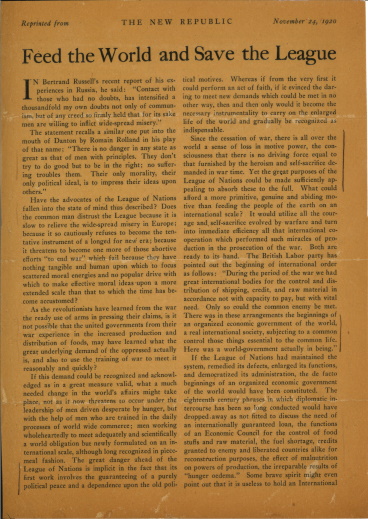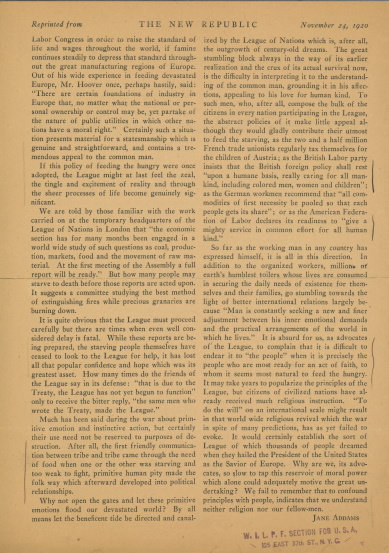Introduction
Jane Addams (1860-1935) was a well-known social reformer, suffragist and the founder of the Hull-House settlement. During World War I, Addams became one of the United States’ best-known pacifists. She founded the Woman’s Peace Party in 1914 and the International Committee of Women for a Permanent Peace at the International Congress of Women in 1915, which became the Women’s International League for Peace and Freedom in 1919. Addams never wavered from her commitment to peace, even after the United States entered World War I. After the war, Addams and other pacifists sought to have women’s voices heard in the creation of a new international society. But neither the Paris Peace Conference or the ensuing League of Nations viewed the problems facing society the same way. In America, the Senate rejected the Paris Peace Treaty on November 19, 1919, and opposed American entry into the League of Nations. Many Americans opposed further foreign entanglements. Addams saw danger in the widespread poverty in Europe after the war and spoke widely on how a different view of internationalism could improve conditions in the world. This article was published by the New Republic on November 24, 1920 and also delivered as a speech before the Labor Forum in Detroit on November 28, 1920.
Image
Document Text
In Bertrand Russell’s1Bertrand Russell (1872-1970) was a British philosopher who traveled to Russia in August 1920 and wrote a four-part series in the Nation entitled “Soviet Russia–1920.” recent report of his experiences in Russia, he said: “Contact with those who had no doubts, had intensified a thousandfold my own doubts not only of communism, but of any creed so firmly held that for its sake men are willing to inflict wide-spread misery.”2Add
The statement recalls a similar one put into the mouth of Danton by Romain Rolland in his play of that name: “There is no danger in any state as great as that of men with principles. They don’t try to do good but to be in the right; no suffering troubles them. Their only morality, their only political ideal, is to impress their ideas upon others.”3Romain Rolland (1866-1944) was a French dramatist who wrote Danton (1900), a play about Georges Danton (1759-1794) a leading figure in the French Revolution.
Have the advocates of the League of Nations fallen into the state of mind thus described? Does the common man distrust the League because it is slow to relieve the wide-spread misery in Europe;4Food shortages in Europe that had begun before the end of the war were exacerbated, especially in the Central Powers and Eastern Europe, by blockades, crop failures and poor transportation. Women and children suffered the most and the American government and charitable agencies sought to offer relief. because it so cautiously refuses to become the tentative instrument of a longed for new era; because it threatens to become one more of those abortive efforts “to end war” which fails because they have nothing tangible and human upon which to focus scattered moral energies and no popular drive with which to make effective moral ideas upon a more extended scale than that to which the time has become accustomed?
As the revolutionists have learned from the war the ready use of arms in pressing their claims, is it not possible that the united governments from their war experience in the increased production and distribution of foods, may have learned what the great underlying demand of the oppressed actually is, and also to use the training of war to meet it reasonably and quickly?
If this demand could be recognized and acknowledged as in a great measure valid, what a much needed change in the world’s affairs might take place, not as it now threatens to occur under the leadership of men drive desperate by hunger, but with the help of men who are trained in the daily processes of world wide commerce; men working wholeheartedly to meet adequately and scientifically a world obligation but newly formulated on an international scale, although long recognized in piecemeal fashion. The great danger ahead of the League of Nations is implicit in the fact that its first work involves the guaranteeing of a purely political peace and a dependence upon the old political motives. 5The League’s goals were to prevent war through collective security, disarmament, and arbitration of disputes. Without its own military force, it relied on the cooperation of members, specifically the World War I Allies. Addams and the Women’s International League for Peace and Freedom thought that the League should adopt a more humanitarian focus rather than a strictly political one. Whereas if from the very first it could perform an act of faith, if it evinced the daring to meet new demands which could be met in no other way, then and then only would it become the necessary instrumentality to carry on the enlarged life of the world and gradually be recognized as indispensable.
Since the cessation of war, there is all over the world a sense of loss in motive power, the consciousness that there is no driving force equal to that furnished by the heroism and self-sacrifice demanded in war-time. Yet the great purposes of the League of Nations could be made sufficiently appealing to absorb these to the full. What could afford a more primitive, genuine and abiding motive than feeding the people of the earth on an international scale? It would utilize all the courage and self-sacrifice evolved by warfare and turn it into immediate efficiency all that international cooperation which performed such miracles of production in the prosecution of the war. Both are ready to its hand. The British Labor party6The Labour Party in the United Kingdom was a center-left political party that grew from trade union and socialist movements. In the early 1920s, it emerged as the main opponent of the Conservative Party. has pointed out the beginning of international order as follows: “During the period of the war we had great international bodies for the control and distribution of shipping, credit, and raw material in accordance not with capacity to pay, but with vital need. Only so could the common enemy be met. There was in these arrangements the beginnings of an organized economic government of the world, a real international society, subjecting to a common control those things essential to the common life. Here was a world-government actually in being.”
If the League of Nations had maintained the system, remedied its defects, enlarged its functions, and democratized its administration, the de facto beginnings of an organized economic government of the world would have been constituted. The eighteenth century phrases in which diplomatic intercourse has been so long conducted would have dropped away as not fitted to discuss the need of an internationally guaranteed loan, the functions of an Economic Council for the control of food stuffs and raw material, the fuel shortage, credits granted to enemy and liberated countries alike for reconstruction purposes, the effect of malnutrition on powers of production, the irreparable results of “hunger oedema.”7Hunger oedema is swelling that occurs in malnourished people. Some brave spirit might even point out that it is useless to hold an International Labor Congress in order to raise the standard of life and wages throughout the world, if famine continues steadily to depress that standard throughout the great manufacturing regions of Europe. Out of his wide experience in feeding devastated Europe, Mr. Hoover once, perhaps hastily, said: “There are certain foundations of industry in Europe that, no matter what the national or personal ownership or control may be, yet partake of the nature of public utilities in which other nations have a moral right.”8Herbert Hoover (1874-1964) an American politician and government official, served as the director the American Relief Association, which provided food to starving Europeans in Central and Eastern Europe. He became Secretary of Commerce in 1920 and was elected President in 1928. For Hoover’s testimony before the Senate see Hearings. Certainly such a situation presents material for a statesmanship which is genuine and straightforward, and contains a tremendous appeal to the common man.
If this policy of feeding the hungry were once adopted, the League might at last feel the zeal, the tingle and excitement of reality and through the sheet processes of life become genuinely significant.
We are told by those familiar with the work carried on at the temporary headquarters of the League of Nations in London that “the economic section has for many months been engaged in a world wide study of such questions as coal, production, markets, food and the movement of raw material. At the first meeting of the Assembly a full report will be ready.”9The League of Nations’ first assembly was held on November 15, 1920. For a report, see The First Assembly of the League of Nations. But how many people may starve to death before those reports are acted upon. It suggests a committee studying the best method of extinguishing fires while precious granaries are burning down.
It is quite obvious that the League must proceed carefully but there are times when even well considered delay is fatal. While these reports are being prepared, the starving people themselves have ceased to look to the League for help, it has lost all that popular confidence and hope which was its greatest asset. How many times do friends of the League say in its defense: “that is due to the Treaty, the League has not yet begun to function” only to receive the bitter reply, “the same men who wrote the Treaty, made the League.”
Much has been said during the war about primitive emotion and instinctive action, but certainly their use need not be reserved to the purposes of destruction. After all, the first friendly communication between tribe and tribe came through the need for food when one or the other was starving and too weak to fight, primitive human pity made the folk way which afterward developed into political relationships.
Why not open the gates and let these primitive emotions flood our devastated world? By all means let the beneficent tide be directed and canalized by the League of Nations which is, after all, the outgrowth of century-old dreams. The great stumbling block always in the way of its earlier realization and the crux of its actual survival now, is the difficulty in interpreting it to the understanding of the common man, grounding it in his affections, appealing to his love for humankind. To such men, who, after all, compose the bulk of the citizens in every nation participating in the League, the abstract policies of it make little appeal although they would gladly contribute their utmost to feed the starving, as two and a half million French trade unionists regularly tax themselves for the children of Austria; as the British Labor party insists that the British foreign policy shall rest “upon a humane basis, really caring for all mankind, including colored men, women and children”; as the German workmen recommend that “all commodities of first necessity be pooled so that each people gets its share”; or as the American Federation of Labor declares its readiness to “give a mighty service in common effort for all humankind.”
So far as the working man in any country has expressed himself, it is all in this direction. In addition to the organized workers, millions of earth’s humblest toilers whose lives are consumed in securing the daily needs of existence for themselves and their families, go stumbling towards the light of better international relations largely because “Man is constantly seeking a new and finer adjustment between his inner emotional demands and the practical arrangements of the world in which he lives.” It is absurd for us, as advocates of the League, to complain that it is difficult to endear it to “the people” when it is precisely the people who are most ready for an act of faith, to whom it seems most natural to feed the hungry. It may take years to popularize the principles of the League, but citizens of civilized nations have already received much religious instruction. “To do the will” on an international scale might result in that world wide revival which the war in spite of many predictions, has as yet failed to evoke. I would certainly establish the sort of League of which thousands of people dreamed when they hailed the President of the United States as the savior of Europe.10Addams refers to Woodrow Wilson (1856-1924), President of the United States since 1913. Wilson’s decision to enter World War I and his insistence on a peace designed to help prevent future conflicts, made him extremely popular in Europe. Wilson lost popularity in the United States, however, and while campaigning for the peace treaty, suffered a major stroke. Why are we, its advocates, so slow to tap this reservoir of moral power which along could adequately motive the great undertaking? We fail to remember that to confound principles with people, indicates that we understand neither religion nor our fellow-man. JANE ADDAMS
Source
Jane Addams, “Feed the World and Save the League,” The New Republic (Nov. 24, 1920): 325-327.
More resources
Jane Addams Digital Edition provides letters and other writings of Jane Addams.
The Covenant of the League of Nations. Yale Law School Avalon Project.
Frank Jacobs, “Map Shows U.S. Effort to Feed Europe After WWI,” Big Think, Oct.r 23, 2018.

Cathy Moran Hajo teaches Discovering Digital History at Ramapo College of New Jersey. She is the editor and director of the Jane Addams Papers Project, and formerly worked on the Margaret Sanger Papers Project. She is currently the Vice President and Archives Director of the Mahwah Museum.


